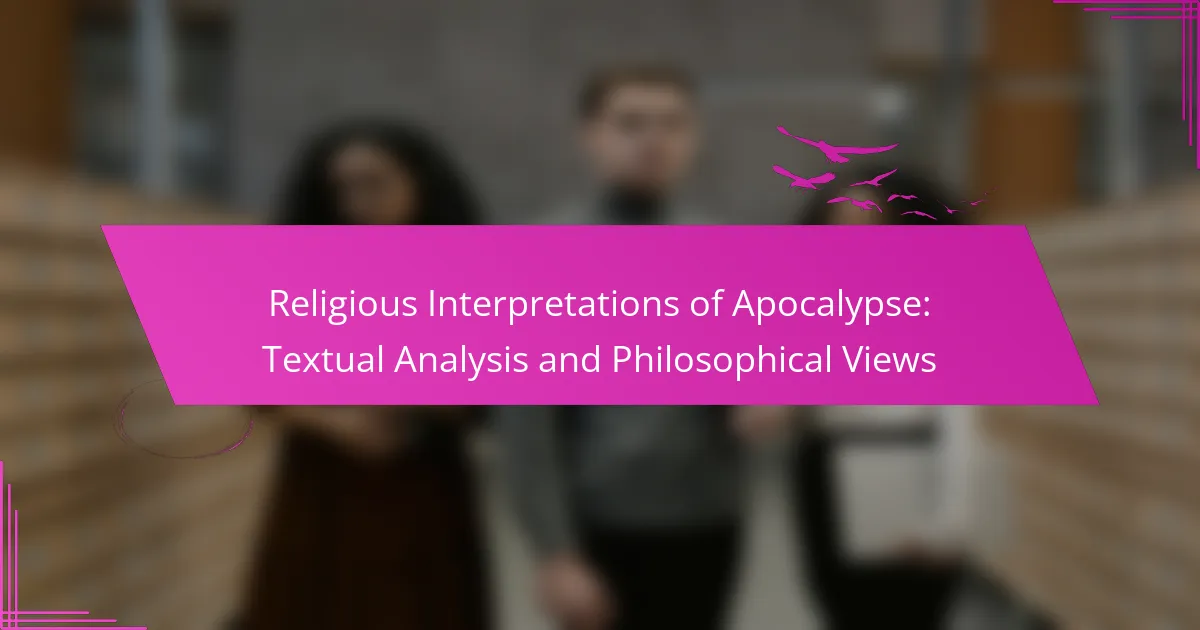Religious interpretations of the Apocalypse reveal diverse perspectives on end-times narratives across various faiths. Key texts such as the Bible, Quran, and Bhagavad Gita provide unique insights into eschatological views and moral accountability. Historical contexts shape these interpretations, influencing how societies perceive impending doom and renewal. Additionally, philosophical inquiries challenge traditional beliefs, exploring the implications of apocalypse on human existence and agency.
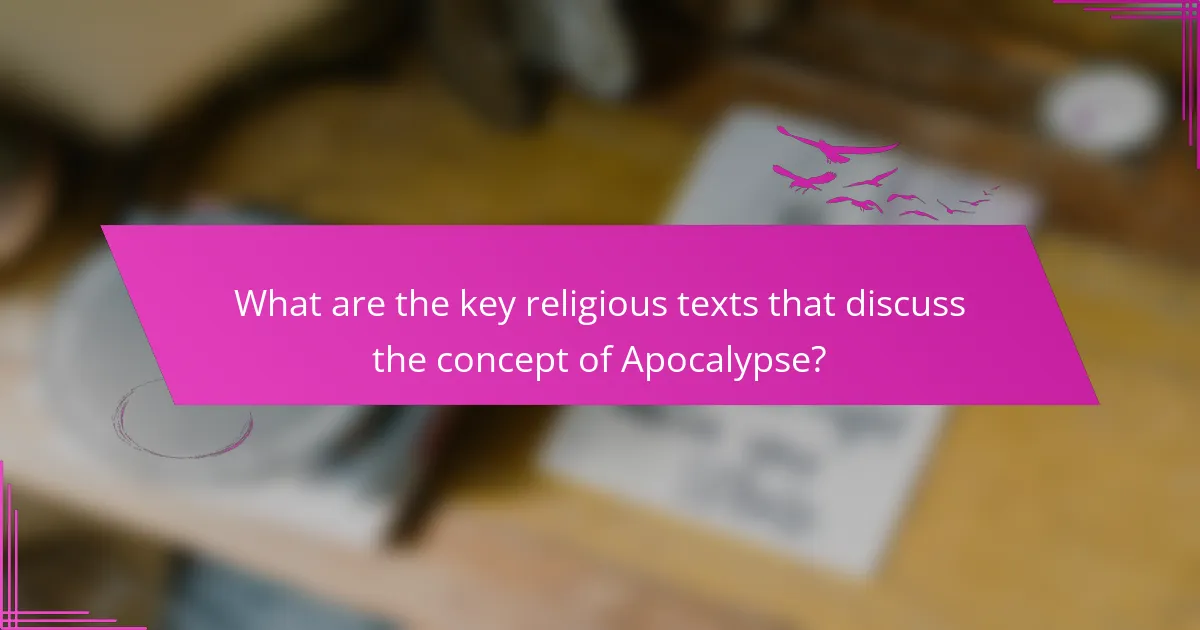
What are the key religious texts that discuss the concept of Apocalypse?
Key religious texts discussing the concept of Apocalypse include the Bible, the Quran, and the Bhagavad Gita.
The Bible contains the Book of Revelation, which provides vivid imagery and prophecies about the end times. The Quran discusses the Day of Judgment and the signs preceding it in various verses. The Bhagavad Gita addresses the cyclical nature of time and the eventual dissolution of the universe, presenting a philosophical perspective on apocalypse.
These texts reflect diverse interpretations of apocalypse, emphasizing moral accountability and the transformative potential of these events. The distinct narratives and teachings offer insights into how different cultures perceive the end of the world and the hope for renewal.
How do different faiths interpret apocalyptic literature?
Different faiths interpret apocalyptic literature through unique theological lenses and historical contexts. Christianity often views it as a prophecy of Christ’s return, emphasizing hope and redemption. In Judaism, apocalyptic texts reflect national identity and divine justice, focusing on restoration after exile. Islam interprets the apocalypse as a sign of the Day of Judgment, highlighting moral accountability. Hinduism presents cyclical destruction and rebirth, viewing the apocalypse as part of cosmic order. Each tradition offers distinct insights into human existence and the ultimate fate of the world.
Which biblical passages are most commonly referenced in apocalyptic discussions?
Common biblical passages referenced in apocalyptic discussions include Revelation 21:1-4, Matthew 24:30-31, Daniel 12:1-3, Isaiah 65:17-25, and 1 Thessalonians 4:16-17. These texts provide insights into themes of judgment, resurrection, and the promise of a new heaven and earth. The Book of Revelation, particularly, is central due to its vivid imagery and prophetic nature, making it a focal point in eschatological studies.
What are the roles of prophecy and revelation in religious interpretations of Apocalypse?
Prophecy and revelation play crucial roles in religious interpretations of the Apocalypse by offering insights into divine intentions and future events. These elements shape believers’ understanding of eschatology, influencing moral and ethical behaviours. Prophetic texts often contain symbolic language that invites interpretation, while revelations provide direct communication from the divine. Together, they create a framework for understanding the end times, emphasizing themes of judgment, hope, and redemption. This duality encourages a reflective approach to faith, urging followers to consider their actions in light of potential outcomes.
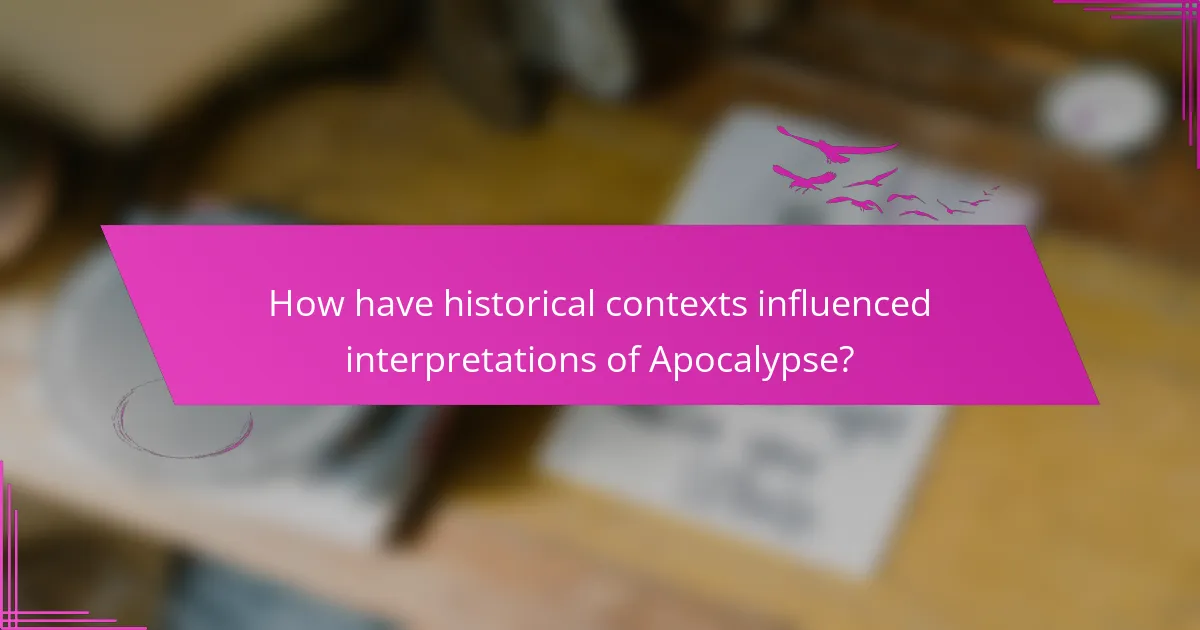
How have historical contexts influenced interpretations of Apocalypse?
Historical contexts have significantly shaped interpretations of the Apocalypse, influencing both religious texts and philosophical views. Different eras have brought unique perspectives, often reflecting contemporary societal fears and hopes.
For instance, during the early Christian period, the Apocalypse was seen as a message of hope against Roman oppression. In contrast, the Reformation period reinterpreted it as a critique of the Catholic Church, emphasizing personal faith.
The 20th century brought existential and apocalyptic themes, linking the Apocalypse with modern anxieties about nuclear war and environmental collapse. These shifts demonstrate how historical circumstances can alter the understanding of apocalyptic literature, revealing its adaptability to human experience.
Overall, the interplay between historical context and religious interpretation highlights the evolving nature of the Apocalypse as a reflection of human concerns across time.
What are the cultural implications of apocalyptic beliefs in various societies?
Apocalyptic beliefs significantly shape cultural narratives and social behaviours in various societies. These beliefs often reflect underlying fears and hopes about humanity’s future, influencing ethical frameworks and community cohesion.
In Christianity, apocalyptic texts like Revelation emphasize redemption and divine justice, shaping moral conduct and community identity. Similarly, in Hinduism, concepts of cyclical time and cosmic destruction influence societal views on life and duty.
In indigenous cultures, apocalyptic narratives often center on environmental stewardship and harmony with nature, reflecting unique relationships with the land. For example, the Hopi tribe’s prophecies address ecological balance and community resilience.
Overall, these beliefs foster a sense of purpose and urgency, prompting societal action and cultural expression around themes of survival and renewal.
How do major historical events shape apocalyptic narratives?
Major historical events significantly influence apocalyptic narratives by shaping cultural perceptions and interpretations. Events like wars, natural disasters, and pandemics often serve as catalysts for these narratives, reflecting societal fears and moral lessons. For example, the World Wars prompted interpretations of apocalypse as a judgment on humanity’s actions. Additionally, the rise of technology and climate change concerns have created new apocalyptic frameworks, emphasizing human responsibility. These narratives often incorporate religious texts, which provide a foundation for understanding end-times scenarios, blending philosophy with historical context. This interplay reveals how collective experiences mold beliefs about the future and existential threats.
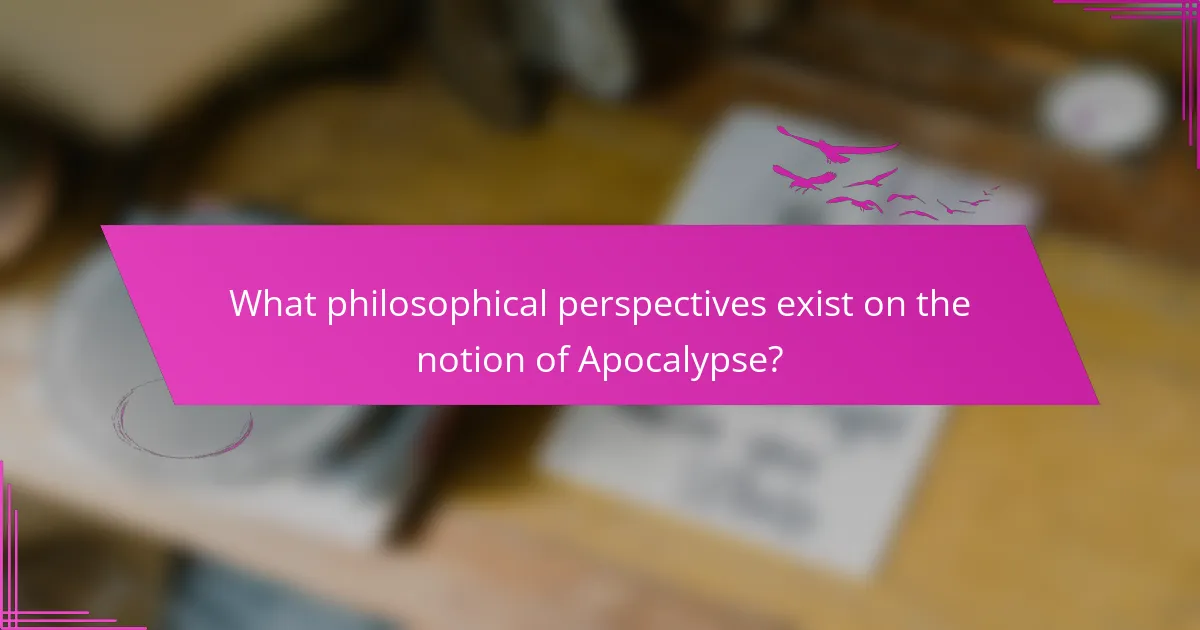
What philosophical perspectives exist on the notion of Apocalypse?
Religious interpretations of the Apocalypse vary widely across different faiths and philosophies. Major perspectives include eschatological views, which focus on end-times prophecies, and existential interpretations that explore the implications of apocalypse on human existence.
In Christianity, the Book of Revelation presents a vivid depiction of the end times, emphasizing judgment and redemption. This text has shaped theological discourse, leading to diverse interpretations regarding salvation and the nature of divine justice.
In contrast, Hindu philosophy presents the concept of cyclical time, where the universe undergoes periodic destruction and rebirth. This perspective emphasizes renewal rather than finality, suggesting an ongoing process of creation and dissolution.
Philosophically, thinkers like Nietzsche have critiqued apocalyptic narratives, viewing them as reflections of human anxiety about existence. This existential approach challenges traditional religious interpretations, focusing on individual agency and the search for meaning amidst chaos.
Overall, the notion of the Apocalypse serves as a rich field for philosophical inquiry, reflecting diverse cultural and theological insights.
How do existentialist views frame the understanding of Apocalypse?
Existentialist views frame the understanding of Apocalypse as a reflection on human existence and freedom. They emphasize individual responsibility in confronting the absurdity of life. Existentialist thinkers like Jean-Paul Sartre and Martin Heidegger suggest that the Apocalypse symbolizes the ultimate confrontation with existential dread and the necessity of authentic choice. This perspective shifts the focus from divine intervention to human agency in shaping meaning amidst chaos. The Apocalypse, thus, becomes a metaphor for personal awakening and the search for purpose in a seemingly indifferent universe.
Which philosophical theories challenge traditional interpretations of apocalyptic events?
Philosophical theories such as existentialism and postmodernism challenge traditional interpretations of apocalyptic events by emphasizing subjective experience and the relativity of truth. Existentialists argue that meaning is constructed rather than inherent, suggesting apocalyptic narratives reflect human fears rather than divine prophecy. Postmodernism critiques the grand narratives, including religious texts, asserting that interpretations of apocalypse are culturally and historically contingent. These perspectives encourage a re-examination of apocalyptic symbolism, viewing it as a reflection of contemporary anxieties rather than absolute predictions.
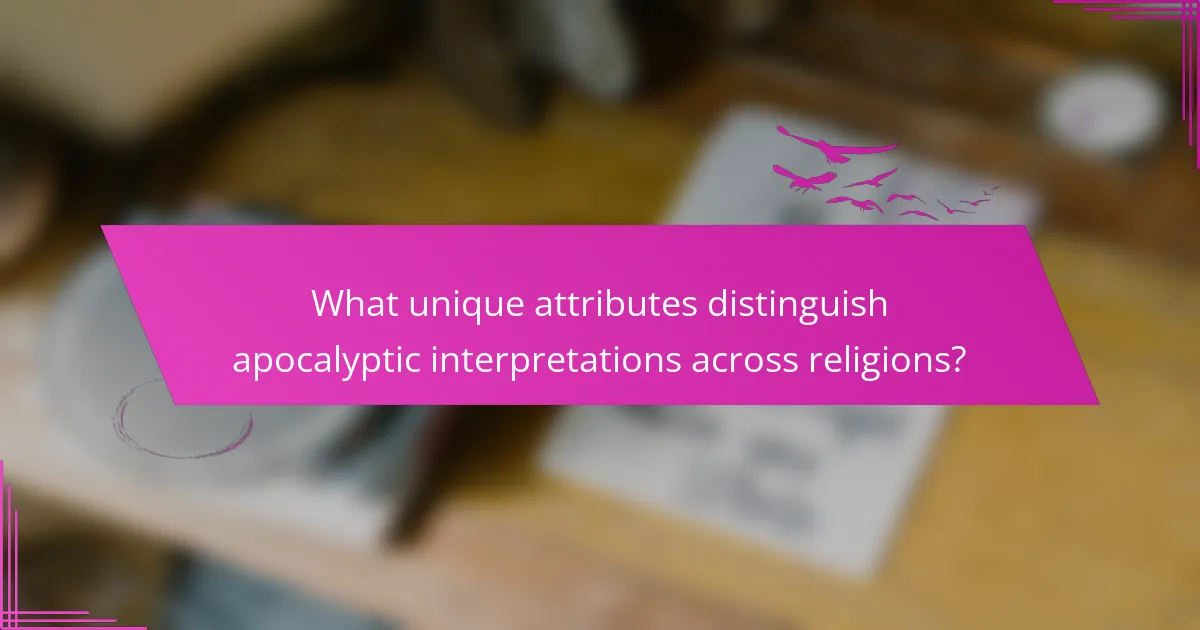
What unique attributes distinguish apocalyptic interpretations across religions?
Unique attributes that distinguish apocalyptic interpretations across religions include varying eschatological timelines, differing views on divine judgment, and the role of humanity in the end times. For example, Christianity often emphasizes a final judgment day, while Buddhism presents a cyclical view of time and rebirth. Additionally, unique attributes such as the concept of the Mahdi in Islam or the Hindu notion of Kalki differ significantly from Western interpretations. These distinctions shape followers’ beliefs and behaviours regarding morality and hope for the future.
How do eschatological beliefs differ between Christianity and Islam?
Eschatological beliefs in Christianity and Islam differ significantly in their interpretations of the apocalypse. Christianity often emphasizes the return of Jesus Christ and the final judgment, while Islam focuses on the Day of Resurrection and the role of the Mahdi.
Christianity presents a dualistic view of good and evil, culminating in a new heaven and earth. In contrast, Islam stresses accountability for one’s actions, leading to paradise or hell based on individual deeds.
Both religions share a belief in divine intervention and the end of the world but diverge in their narratives and theological implications. These differences reflect unique attributes of their respective scriptures and traditions, shaping followers’ perspectives on life and afterlife.
What are the distinctive features of Hindu and Buddhist views on Apocalypse?
Hindu and Buddhist views on Apocalypse differ significantly. Hinduism anticipates cyclical destruction and renewal through the concept of Kalpa, while Buddhism emphasizes impermanence and the cessation of suffering rather than a definitive end.
Hinduism envisions a cosmic cycle comprising creation, preservation, and destruction, with deities like Shiva playing a crucial role in the dissolution phase. This cyclical perspective highlights rebirth and continuity within the universe.
Conversely, Buddhism’s interpretation focuses on the transient nature of existence. The end of the world is less about destruction and more about achieving Nirvana, where individuals transcend suffering and the cycle of rebirth. This unique attribute underscores a philosophical approach to endings rather than a literal apocalypse.
In summary, Hinduism presents a cyclical and deity-driven narrative, while Buddhism offers a philosophical perspective centered on impermanence and liberation.
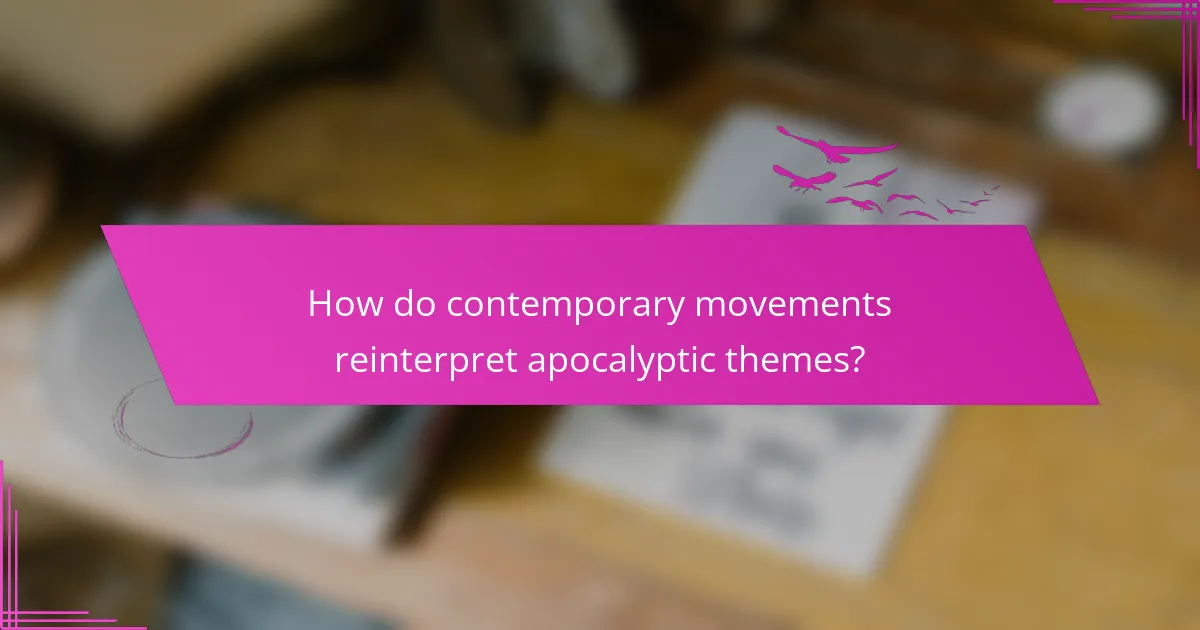
How do contemporary movements reinterpret apocalyptic themes?
Contemporary movements reinterpret apocalyptic themes by emphasizing hope and renewal rather than solely destruction. These reinterpretations often draw from religious texts, highlighting a transformative understanding of the end times. For instance, many modern interpretations focus on social justice, environmental stewardship, and personal growth as pathways to a new beginning. This shift reflects a unique attribute of contemporary thought, where apocalyptic narratives serve as catalysts for positive change rather than mere forewarnings of doom. As a result, these movements encourage active engagement with societal issues, fostering a sense of urgency to create a better future.
What role does popular culture play in shaping modern apocalyptic narratives?
Popular culture significantly influences modern apocalyptic narratives by integrating diverse religious interpretations and philosophical views. These narratives often reflect societal anxieties and moral dilemmas, shaping public perception of potential futures. For instance, films and literature frequently draw on religious texts, reinterpreting them to resonate with contemporary audiences. This blending of cultural elements fosters a unique dialogue between ancient beliefs and modern existential concerns. As a result, apocalyptic themes in popular culture serve as a mirror to current societal issues, highlighting fears of environmental collapse, technological advancement, and moral decay.
How do environmental concerns influence current apocalyptic interpretations?
Environmental concerns significantly shape modern apocalyptic interpretations by emphasizing themes of ecological collapse and human responsibility. These interpretations often reflect anxieties about climate change, resource depletion, and biodiversity loss.
Religious texts are increasingly reinterpreted to align with contemporary environmental issues. For example, concepts of stewardship and judgment in various faiths resonate with current ecological crises. This shift in interpretation highlights a unique attribute of religious thought: its adaptability to societal concerns.
Philosophical views on apocalypse now often include discussions about sustainability and ethical living. As a result, apocalyptic narratives serve as cautionary tales, urging action against environmental degradation. This trend illustrates a rare attribute of modern apocalyptic thought, where spiritual urgency intersects with environmental activism.
Overall, the fusion of environmental concerns with apocalyptic interpretations reflects a growing awareness of humanity’s impact on the planet and the moral imperatives that arise from it.
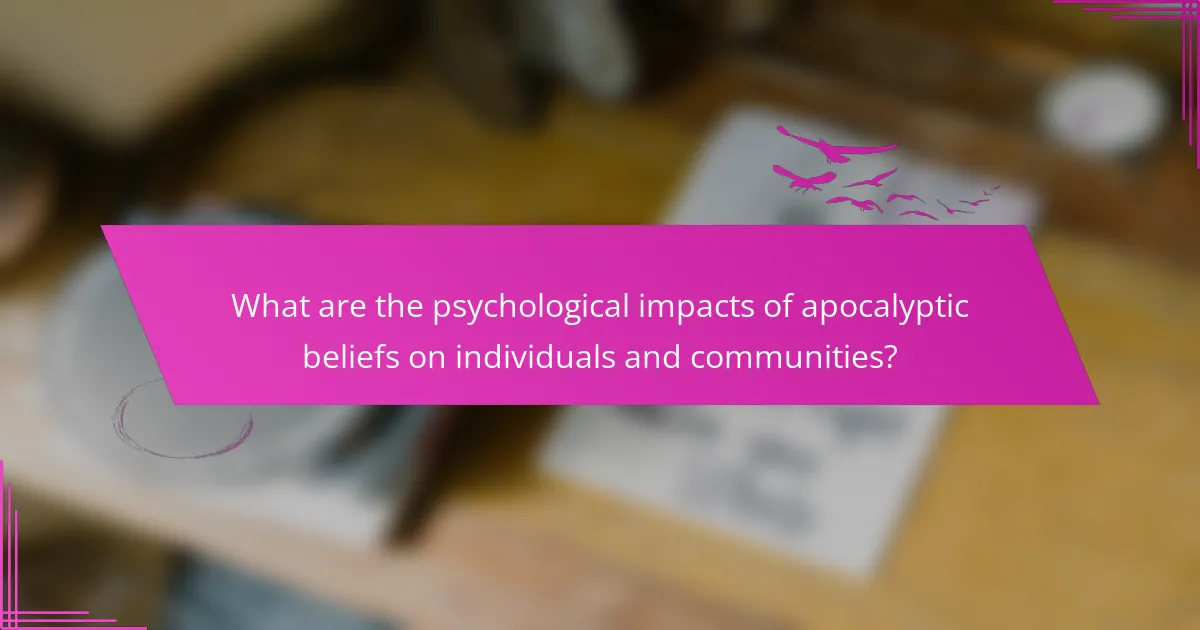
What are the psychological impacts of apocalyptic beliefs on individuals and communities?
Apocalyptic beliefs can significantly impact individuals and communities by inducing fear, anxiety, and a sense of urgency. These beliefs often shape worldviews, influencing moral decisions and social behaviours. For instance, individuals may adopt extreme lifestyles or engage in community mobilization.
The psychological effects include heightened stress levels and existential crises, as individuals grapple with perceived impending doom. Communities may experience fragmentation or cohesion, depending on how beliefs are interpreted and acted upon.
Religious interpretations often provide a framework for understanding these beliefs, offering hope or justification for radical actions. Philosophical views can further deepen the discourse, questioning the implications of such beliefs on human existence and societal structures.
Overall, the psychological impacts of apocalyptic beliefs are complex, intertwining individual and communal experiences, shaped by various religious and philosophical interpretations.
How does fear of the Apocalypse affect social behavior and decision-making?
Fear of the Apocalypse significantly influences social behavior and decision-making. Individuals often exhibit heightened anxiety, leading to increased reliance on religious interpretations for guidance.
Religious texts frequently depict apocalyptic scenarios, shaping followers’ worldviews. For example, interpretations of the Book of Revelation can instill urgency and a sense of impending judgment. This belief may drive people to engage in communal activities, such as prayer or outreach, as they seek solace and meaning in uncertain times.
Philosophically, the fear of an apocalypse can lead to existential reflections. Individuals may prioritize ethical decision-making, believing their actions carry eternal consequences. This mindset often fosters a sense of urgency in addressing social issues, as believers feel compelled to act in alignment with their faith.
Moreover, societal responses to apocalyptic fears can manifest in various forms, including increased activism or withdrawal from social interactions. As a result, these behaviors reflect a complex interplay between fear, belief systems, and community dynamics.
What coping mechanisms do individuals employ in response to apocalyptic fears?
Individuals employ various coping mechanisms in response to apocalyptic fears, including religious interpretations and philosophical reflections. Many turn to faith-based practices, such as prayer and community support, which provide comfort and a sense of control. Others engage in existential contemplation, seeking meaning in the face of uncertainty. Some may also adopt proactive behaviors, such as preparation and education, to mitigate perceived threats. These mechanisms reflect a blend of psychological resilience and spiritual engagement, highlighting the diverse ways individuals navigate their fears.
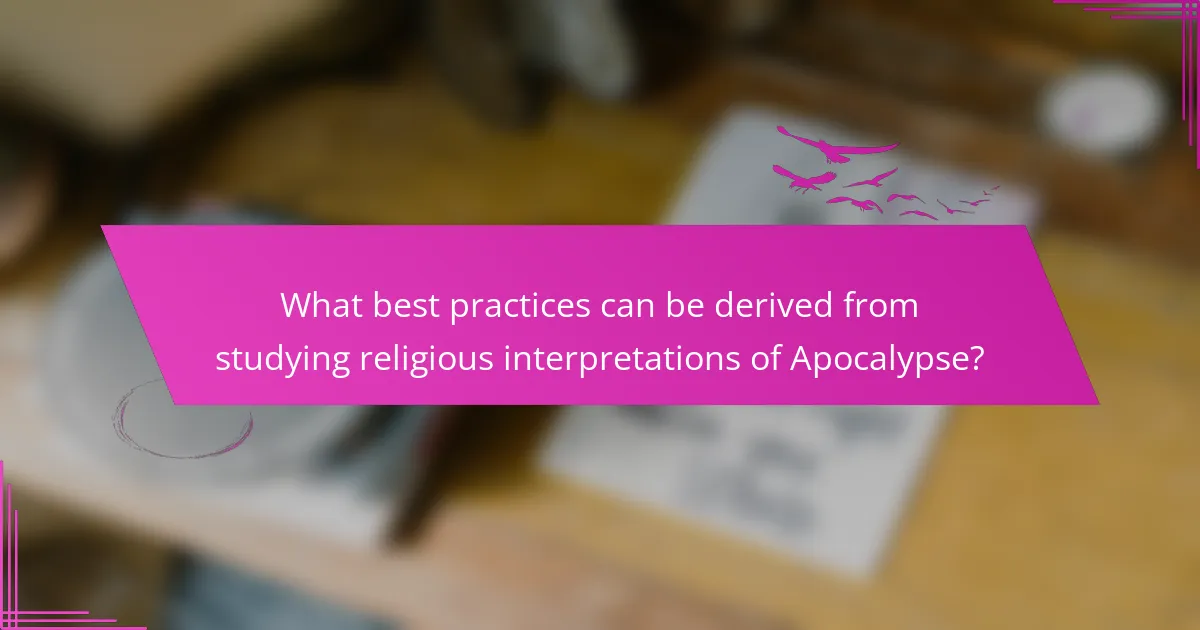
What best practices can be derived from studying religious interpretations of Apocalypse?
Studying religious interpretations of the Apocalypse reveals best practices for understanding diverse perspectives. These interpretations encourage critical thinking, promote interfaith dialogue, and highlight the importance of historical context.
Engaging with various texts fosters analytical skills, as readers discern differing theological views. For instance, examining the Book of Revelation alongside other religious texts can illuminate unique attributes of each tradition’s eschatology.
Additionally, these interpretations emphasize the role of symbolism, urging scholars to explore deeper meanings rather than surface-level readings. This approach can enhance comprehension of complex themes like redemption and judgment, which are prevalent across many belief systems.
Lastly, incorporating philosophical views enriches discussions on morality and ethics in relation to end-times narratives. This multifaceted analysis encourages a holistic understanding of the implications these interpretations hold for contemporary society.
How can interfaith dialogues enhance understanding of apocalyptic themes?
Interfaith dialogues can significantly enhance understanding of apocalyptic themes by fostering diverse perspectives. Engaging various religious viewpoints encourages critical analysis of texts and philosophical ideas surrounding the apocalypse. This collaboration can reveal shared concerns about morality, justice, and human destiny, promoting mutual respect and empathy among different faiths. Through discussions, participants may uncover unique interpretations and rare insights that challenge rigid doctrines, ultimately enriching the collective understanding of these complex themes.
What strategies can communities adopt to address apocalyptic anxieties?
Communities can adopt various strategies to address apocalyptic anxieties by fostering resilience and promoting understanding. Engaging in interfaith dialogues can build bridges and reduce fear by highlighting shared beliefs. Educational programs can demystify apocalyptic narratives, encouraging critical thinking about religious texts. Mental health support services are essential, providing coping mechanisms for anxiety-related issues. Community-building activities can strengthen social bonds, creating a support network that mitigates feelings of isolation. Finally, promoting positive narratives about the future can inspire hope and counteract negative outlooks.
